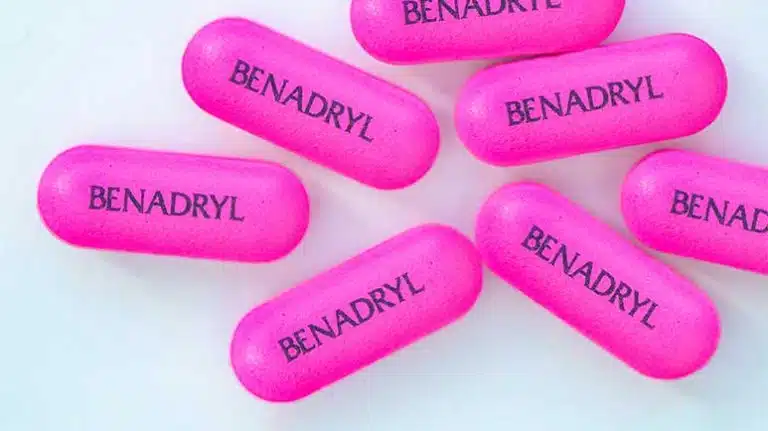Is Benadryl Addictive?

Because Benadryl is sold over the counter, some people assume it’s not dangerous. However, if you use it in a manner not recommended, the drug can be addictive.
Benadryl is the brand name for an over-the-counter drug called diphenhydramine. As an antihistamine, it treats symptoms of allergies and the common cold, such as runny nose, itchy eyes, and sneezing.
How Does Benadryl Work?
Benadryl prevents histamines from attaching to cell receptors in your brain. Histamines are chemicals that trigger allergic reactions.
Benadryl is also an anticholinergic. That means it blocks the actions of a brain chemical called acetylcholine. This blockage has a sedative effect, which is why some people use Benadryl as a sleep aid.
Is Benadryl Addictive?
Benadryl can be addictive, especially with long-term use or abuse. Benadryl abuse occurs when you use the drug in a manner not recommended by your doctor.
For example, you might exceed the recommended dose or use it for a long period of time. If you’re not sure whether you are using Benadryl safely, talk to your doctor.
Signs Of Benadryl Addiction
Like all forms of drug addiction (also called substance use disorder), Benadryl addiction can cause both psychological and physical dependence.
Psychological dependence means you will feel unable to stop using Benadryl even if you want to.
You may develop strong cravings for the drug and lose interest in activities that don’t involve it. You might also experience mood swings, loss of motivation, and an urge to isolate yourself from loved ones so you can spend more time using Benadryl.
Physical dependence means your body starts relying on Benadryl to function. If you stop using it without the help of a doctor, you may experience withdrawal symptoms such as:
- nausea and vomiting
- diarrhea
- cold sweats
- anxiety
- irritability
- muscle aches
Risks Of Benadryl Addiction
Like most over-the-counter medications, Benadryl can cause side effects. You’re more likely to experience them if you abuse or are addicted to the drug. The most common side effects of Benadryl include:
- drowsiness
- dizziness
- headache
- muscle weakness
- dry mouth, throat, or nose
- constipation
- nausea and vomiting
- loss of appetite
- excitement and/or nervousness
People who abuse Benadryl may also experience rarer, more serious side effects, such as:
- vision problems
- difficult or painful urination
- hallucinations (seeing, hearing, or feeling things that aren’t there)
- trouble concentrating
- short-term memory loss
- low blood pressure
- heart problems
If you or someone you know experiences these more serious effects seek medical advice right away.
Benadryl Overdose
Benadryl is a central nervous system (CNS) depressant. That means it slows down brain activity. If you take more than the recommended dose, or if you mix Benadryl with other CNS depressants (such as alcohol or benzodiazepines), your brain activity may slow to the point of overdose.
Common symptoms of a Benadryl overdose include:
- extreme drowsiness
- nausea and vomiting
- blurred vision
- anxiety
- confusion
- hallucinations
- faster heart rate
- shaking
- seizures
- loss of consciousness
When left untreated, a Benadryl overdose may be fatal. If you think you or someone you know is overdosing on the drug, call 911 immediately.
Benadryl Addiction Treatment Options
Like other diseases, Benadryl addiction requires treatment. If you or a loved one is struggling with this drug, seek help at a substance abuse treatment program. These programs are available on an inpatient or outpatient basis.
Inpatient care means you live at a treatment center and receive 24/7 supervision. It’s typically recommended for people with moderate-to-severe addictions or co-occurring mental health conditions (such as depression, bipolar disorder, or schizophrenia).
Outpatient care means you regularly visit a treatment center while living at home. It can work well for people with milder addictions and strong support systems at home.
Both inpatient and outpatient care offer treatment services such as:
Medical Detox
During medical detox, doctors will help you slowly and safely stop using Benadryl so you can avoid or minimize withdrawal symptoms. They may also prescribe medications to treat certain withdrawal symptoms, such as anti-nausea medications.
Mental Health Counseling
While medical detox addresses physical dependence, it does not address psychological dependence. That’s why your treatment plan will also include mental health counseling.
In counseling, a therapist will help you identify your triggers. Triggers are people, places, or other things that make you want to abuse Benadryl. Your therapist will teach you specific ways to cope with your triggers. Some of the most popular coping skills include journaling, meditating, and exercising.
Your therapist can also help you manage any underlying stressors or mental health concerns that led you to abuse Benadryl in the first place.
Support Groups
When recovering from Benadryl addiction, you may feel alone and misunderstood. In a support group, you can discuss your experiences with other people facing similar challenges. You can also learn important coping skills from people who are further along in their recoveries.
To learn more about Benadryl addiction treatment options, please reach out to an Ark Behavioral Health specialist. Our compassionate health care providers offer personalized, evidence-based care to help you or your loved one become drug-free.
Written by Ark Behavioral Health Editorial Team
©2024 Ark National Holdings, LLC. | All Rights Reserved.
This page does not provide medical advice.
Food and Drug Administration - FDA warns about serious problems with high doses of the allergy medicine diphenhydramine (Benadryl)
National Library of Medicine: MedlinePlus - Diphenhydramine
Neurology Clinical Practice - Chronic diphenhydramine abuse and withdrawal

Questions About Treatment?
Ark Behavioral Health offers 100% confidential substance abuse assessment and treatment placement tailored to your individual needs. Achieve long-term recovery.
100% confidential. We respect your privacy.
Prefer Texting?
Our friendly support team is here to chat 24/7. Opt out any time.







 Learn More
Learn More








